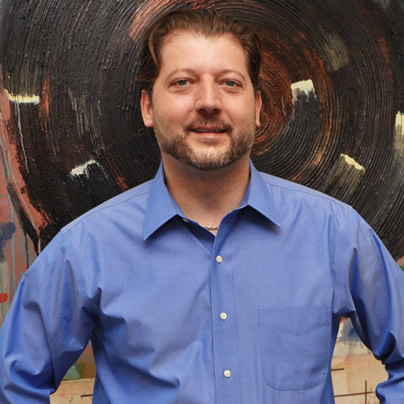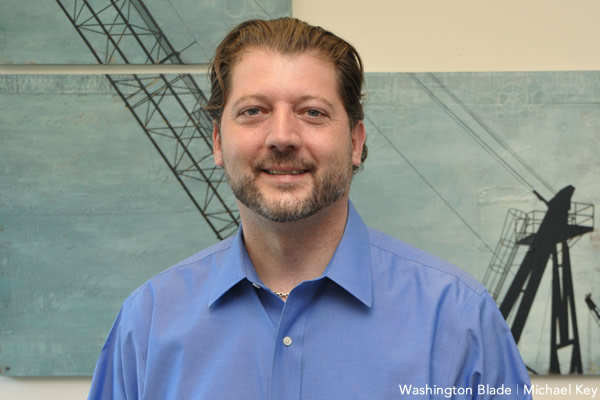Local
Grosso discusses first months in office
At-large councilmember said ethics and election reform remain top priorities

D.C. Councilmember David Grosso (I-At Large) reflected upon his first seven months in office during an interview with the Washington Blade on Monday.
“It’s been a fairly exciting seven months,” Grosso said while speaking to the Blade in his office in the John A. Wilson Building. “I’ve been getting my feet wet, but also getting a well-rounded education on what happens up here.”
Grosso, who was an aide for then-D.C. Councilmember Sharon Ambrose from 2001-2006 and D.C. Congressional Del. Eleanor Holmes Norton’s legislative director from 2006-2007, defeated then-incumbent D.C. Councilmember Michael A. Brown last November for the at-large D.C. Council seat reserved for a non-Democratic candidate.
Grosso said ethics and election reform remain his top priority.
He and Councilmember Kenyan McDuffie (D-Ward 5) in February introduced a bill – the Public Financing of Political Campaigns Amendment Act of 2013 – that would allow candidates to qualify for public financing if they receive contributions of $100 or less from individual donors. Each $100 a political hopeful raises would be matched by $400 under the measure.
“It gets more individuals engaged in the political process,” Grosso said, noting Connecticut and other states have implemented similar systems. “Somebody who donates $10 or $20 can see themselves as having the same political impact as somebody who donates $1,000. It kind of just opens up the doors of the political system.”
Grosso spoke with the Blade less than a week after the D.C. Board of Ethics and Accountability filed Councilmember Marion Barry (D-Ward 8) $13,600 for accepting gifts from two city contractors.
The Washington Post on July 11 reported that Barry said in a statement he voluntarily disclosed the gifts and his “character and integrity remain intact.” He denied any assertions of an ethics scandal during an interview with MSNBC host Melissa Harris-Perry two days later.
“I find it extremely disappointing, just in general,” Grosso, who sits on the committee charged with reviewing the allegations against Barry and determining whether the Council should investigate them, said. He also pointed out he recuses himself from votes on city contracts of more than $1 million. “Councilman Barry has shown time and time again an unwillingness to play by the same rules as everybody else. And for me I think that’s just inexcusable.”
Grosso also supports non-partisan local elections and instant run-offs in contests where no candidate wins with a majority of votes.
“That’s a huge problem in our city, especially in special elections,” he said. “You have people winning with 15, 20, 30 percent of the vote, which is not a representative democracy.”
Government has ‘obligation’ to stop anti-LGBT discrimination
Grosso pointed out LGBT rights issues also remain an important part of his agenda.
The Council last month unanimously approved a bill that Grosso introduced alongside Barry and Councilmembers Tommy Wells (D-Ward 6,) Jack Evans (D-Ward 2,) David Catania (I-At-Large) and Jim Graham (D-Ward 1) that expands the list of people who can officiate a wedding in D.C. Grosso also co-sponsored a bill his colleagues passed that will allow transgender Washingtonians to change the gender on their birth certificates without having undergone sex reassignment surgery.
Grosso, who received an endorsement from the Gay and Lesbian Activists Alliance during his campaign, noted the country continues to make “great strides” on LGBT-specific issues, but noted it has “a long way to go.”
“Every single day we’re going to find a new thing where discrimination was prevalent, and we’re going to have to fix it,” he said. “It’s our obligation as a government to fix those things.”
Councilman blasts AG vote, supports liveable wage bill
Grosso blasted the Council’s late night vote on July 10 to delay next year’s attorney general election that D.C. voters approved in 2010. He specifically criticized Evans and Councilmember Muriel Bowser (D-Ward 4) — who are both running for mayor in 2014 — for supporting the postponement of the referendum’s implementation.
“These people are running for mayor and they think they can just snap their fingers and do away with the peoples’ will,” Grosso said. “But they’re going to turn around in less than a year and ask for the people’s vote. I ask, when are people going to step up and say no, enough is enough with this kind of stuff.”
Grosso, who declined to tell the Blade whether he would support D.C. Mayor Vincent Gray if he were to seek another term in office, has also signed onto a bill that Wells introduced last week that would decriminalize small amounts of marijuana in the nation’s capital. Grosso said he is also working on a separate measure that would legalize the drug in D.C.
Grosso on July 10 also voted for the so-called Wal-Mart bill that would require the company and other large retailers to pay their D.C. employees at least $12.50 an hour – twice the city’s minimum wage of $8.50 an hour. Gray has yet to publicly say whether he will sign the measure into law.
“We must balance the interest of attracting large retailers to our less developed Wards 5, 7 and 8, while also attracting quality jobs to support our residents and their families,” Grosso said in a blog post on Wednesday.
Maryland
Md. Commission on LGBTQIA+ Affairs released updated student recommendations
LGBTQ students report higher rates of bullying, suicide

The Maryland Commission on LGBTQIA+ Affairs has released updated recommendations on how the state’s schools can support LGBTQ students.
The updated 16-page document outlines eight “actionable recommendations” for Maryland schools, supplemented with data and links to additional resources. The recommendations are:
- Developing and passing a uniform statewide and comprehensive policy aimed at protecting “transgender, nonbinary, and gender expansive students” against discrimination. The recommendation lists minimum requirements for the policy to address: name, pronoun usage, and restroom access.
- Requiring all educators to receive training about the specific needs of LGBTQ students, by trained facilitators. The training’s “core competencies” include instruction on terminology, data, and support for students.
- Implementing LGBTQ-inclusive curricula and preventing book bans. The report highlights a “comprehensive sexual education curriculum” as specifically important in the overall education curriculum. It also states the curriculum will “provide all students with life-saving information about how to protect themselves and others in sexual and romantic situations.”
- Establishing Gender Sexuality Alliances “at all schools and in all grade levels.” This recommendation includes measures on how to adequately establish effective GSAs, such as campaign advertising, and official state resources that outline how to establish and maintain a GSA.
- Providing resources to students’ family members and supporters. This recommendation proposes partnering with local education agencies to provide “culturally responsive, LGBTQIA+ affirming family engagement initiatives.”
- Collecting statewide data on LGBTQ youth. The data on Maryland’s LGBTQ youth population is sparse and non-exhaustive, and this recommendation seeks to collect information to inform policy and programming across the state for LGBTQ youth.
- Hiring a full-time team at the Maryland Department of Education that focuses on LGBTQ student achievement. These employees would have specific duties that include “advising on local and state, and federal policy” as well as developing the LGBTQ curriculum, and organizing the data and family resources.
- Promoting and ensuring awareness of the 2024 guidelines to support LGBTQ students.
The commission has 21 members, with elections every year, and open volunteer positions. It was created in 2021 and amended in 2023 to add more members.
The Governor’s Office of Communication says the commission’s goal is “to serve LGBTQIA+ Marylanders by galvanizing community voices, researching and addressing challenges, and advocating for policies to advance equity and inclusion.”
The commission is tasked with coming up with yearly recommendations. This year’s aim “to ensure that every child can learn in a safe, inclusive, and supportive environment.”
The Human Rights Campaign’s most recent report on LGBTQ youth revealed that 46.1 percent of LGBTQ youth felt unsafe in some school settings. Those numbers are higher for transgender students, with 54.9 percent of them saying they feel unsafe in school.
Maryland’s High School Youth Risk Behavior Survey reveals a disparity in mental health issues and concerns among students who identify as LGBTQ, compared to those who are heterosexual. LGBTQ students report higher rates of bullying, feelings of hopelessness, and suicidal thoughts. Nearly 36 percent of LGBTQ students report they have a suicide plan, and 26.7 percent of respondents say they have attempted to die by suicide.
The commission’s recommendations seek to combat the mental health crisis among the state’s LGBTQ students. They are also a call for local and state governments to work towards implementing them.
Virginia
Va. lawmakers consider partial restoration of Ryan White funds
State Department of Health in 2025 cut $20 million from Part B program

The Virginia General Assembly is considering the partial restoration of HIV funding that the state’s Department of Health cut last year.
The Department of Health in 2025 cut $20 million — or 67 percent of total funding — from the Ryan White Part B program.
The funding cuts started with the Trump-Vance administration passing budget cuts to federal HIV screening and protection programs. Rebate issues between the Virginia Department of Health and the company that provides HIV medications began.
Advocates say the funding cuts have disproportionately impacted lower-income people.
The Ryan White HIV/AIDS Program, a federal program started in 1990, provides medical services, public education, and essential services. Part B offers 21 services, seven of which remained funded after the budget cuts.
Equality Virginia notes “in 2025, a 67 percent reduction severely destabilized HIV services across the commonwealth.”
Virginia lawmakers have approved two bills — House Bill 30 and Senate Bill 30 — that would partially restore the funding. The Ryan White cuts remain a concern among community members.
Both chambers of the General Assembly must review their proposed changes before lawmakers can adopt the bills.
“While these amendments aren’t a full restoration of what community-based organizations lost, this marks a critical step toward stabilizing care for thousands of Virginians living with HIV,” said Equality Virginia Executive Director Narissa Rahaman. “Equality Virginia plans to continue their contact with lawmakers and delegates through the conference and up until the passing of the budget.”
“We appreciate lawmakers from both sides of the aisle who recognized the urgency of this moment and will work to ensure funding remains in the final version signed by the governor,” added Rahaman.
District of Columbia
D.C. Black Pride theme, performers announced at ‘Speakeasy’
Durand Bernarr to headline 2026 programming

The Center for Black Equity held its 2026 DC Black Pride Theme Reveal event at Union Stage on Monday. The evening, a “Speakeasy Happy Hour,” was hosted by Anthony Oakes and featured performances by Lolita Leopard and Keith Angelo. The Center for Black Equity organizes DC Black Pride.
Kenya Hutton, Center for Black Equity president and CEO, spoke following the performances by Leopard and Angelo. Hutton announced this year’s theme for DC Black Pride: “New Black Renaissance.”
Performers for 2026 DC Black Pride were announced to be Bang Garcon, Be Steadwell, Jay Columbus, Bennu Byrd, Rue Pratt and Akeem Woods.
Singer-songwriter Durand Bernarr was announced as the headliner for the 2026 festivities. Bernerr gave brief remarks through a video played on the screen at the stage.
DC Black Pride is scheduled for May 22-25. For more information on DC Black Pride, visit dcblackpride.org.



















